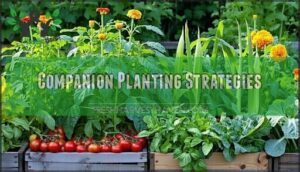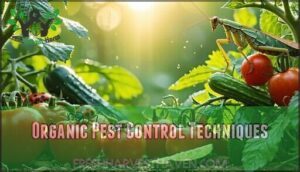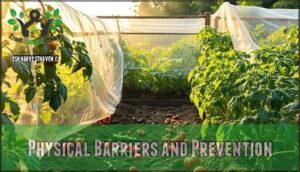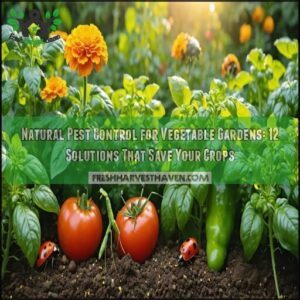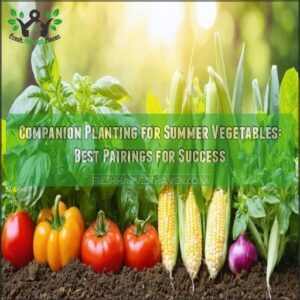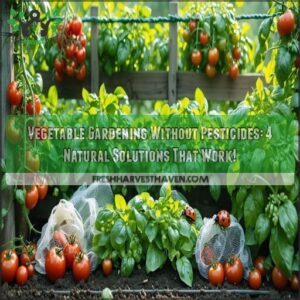This site is supported by our readers. We may earn a commission, at no cost to you, if you purchase through links.
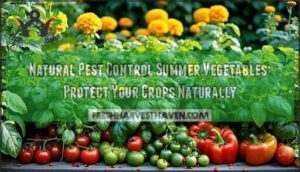 Natural pest control for summer vegetables is simpler than you think.
Natural pest control for summer vegetables is simpler than you think.
First, bring in the good bugs—ladybugs and lacewings love feasting on aphids and mites.
Neem oil works wonders for repelling pests, and it’s eco-friendly. Got marigolds? These cheery flowers don’t just brighten your garden; they deter nematodes and whiteflies, too.
If slugs or caterpillars crash your garden party, sprinkle diatomaceous earth—they hate crawling through it.
Keep your plants strong with compost and regular watering, because healthy veggies fend off pests like pros. And remember, the right companion plants can make all the difference.
Curious? There’s always more to uncover!
Table Of Contents
- Key Takeaways
- Natural Pest Control Methods
- Companion Planting Strategies
- Organic Pest Control Techniques
- Physical Barriers and Prevention
- Enhancing Garden Health and Resistance
- Frequently Asked Questions (FAQs)
- What is the best natural pest control for vegetable gardens?
- What is a natural remedy for bugs on vegetable plants?
- How do I control insect pests in my vegetable garden?
- What is the best natural pest control method?
- How do I get rid of pests in my garden?
- How do I get rid of pests naturally?
- How do you keep cucumber beetles off a vegetable garden?
- How do pests affect a vegetable garden?
- How do I keep bugs out of my vegetable garden naturally?
- How to make natural pesticide for vegetables?
- Conclusion
Key Takeaways
- Attract beneficial bugs like ladybugs and lacewings to naturally control pests without chemicals.
- Use neem oil and diatomaceous earth as eco-friendly, effective solutions for repelling common garden pests.
- Plant marigolds, basil, or garlic for companion planting to deter pests and protect vegetables.
- Rotate crops and use physical barriers like row covers to prevent pest infestations and safeguard your garden.
Natural Pest Control Methods
You can keep your summer vegetables thriving by using natural pest control methods that are safe and effective.
Keep your garden thriving with natural pest control—safe, effective, and gentle on the environment.
From beneficial insects to plant-based sprays, these techniques help you tackle pesky invaders without harming the environment—or your harvest.
Biological Agents for Pest Control
When pests invade, nature provides the perfect defense team.
Here are five biological agents to safeguard your garden:
- Spinosad efficacy keeps pests at bay without harming beneficial insects.
- Bacillus thuringiensis (BT) targets caterpillars with precise control—apply for consistent results.
- Embrace Nematode benefits to battle soil pests like grubs and carrot flies.
- Attract lacewings, powerful eaters of mites and aphids.
- Rely on parasitic wasps, nature’s stealthy pest destroyers.
Consider spinosad insecticide products for effective control.
Let nature do the hard work!
Natural Insecticides and Plant-Based Oils
Need a natural way to guard your summer veggies?
Neem oil uses soap and water to stop pests in their tracks while being gentle on your plants.
Pyrethrin safety makes it a solid organic choice.
Soap effectiveness shines by smothering soft-bodied bugs like aphids.
For precision, try Bt or Spinosad on caterpillars.
With proper oil application, plant-based sprays offer an eco-friendly arsenal in your garden’s pest defense strategy.
Healthy soil is essential, as it strengthens plant immunity against pests, providing a natural way to protect your plants and making it a key part of a pest defense strategy.
Mineral-Based Options for Pest Control
How do minerals help protect your garden? These simple substances pack a punch against pests and can be a game-changer for summer vegetables.
- Diatomaceous Earth scratches and dehydrates bugs but loses strength when wet.
Consider using diatomaceous earth products for your garden.
- Kaolin Clay coats plants, confusing pests and reducing damage.
- Horticultural Sand blocks crawling insects.
- Mineral Oil smothers eggs in crevices.
- Rock Dust builds plant resilience while deterring pests.
For best results, combine methods and prioritize pet safety!
Microbial Control and Its Applications
Microbial control is like hiring tiny superheroes for your garden.
Microbes matter because they can target specific pests without harming the beneficial insects, and Bt applications target caterpillars by disrupting their digestion, while Spinosad specifics use soil microbes to paralyze pests.
Fungal pathogens and microbial pesticides tackle harmful insects without hurting the helpers, and nematode benefits enhance soil health.
Here’s why microbes matter:
| Microbial Method | Target Pests | Eco-Benefit |
|---|---|---|
| Bt Applications | Caterpillars | Precision pest control |
| Spinosad specifics | Soft-bodied pests | Safe for beneficial insects |
| Fungal Pathogens | Mites, Aphids | Soil microbe sustainability |
Companion Planting Strategies
You can outsmart pests by pairing the right plants together to keep them away from your vegetables.
Think of it like setting up your garden’s own bug-repellent team—marigolds, garlic, and basil are some of nature’s best defenders!
Companion Planting for Pest Deterrence
Strong-smelling herbs like basil or flowers like marigolds are natural heroes in pest prevention.
These aromatic pest repellents create barriers, stopping aphids and mites while inviting beneficial insects like ladybugs.
Companion planting with these natural pest control champions protects your summer vegetables and boosts soil health—your garden thrives without harmful sprays.
It’s a win-win—healthy crops, happy plants, and fewer pests!
Companion Planting for Pest Attraction and Benefit
Let pests feast elsewhere by using trap cropping with plants like nasturtiums or mustard to protect your vegetables. These sacrificial plants lure pests away from your main crops, keeping them safe and healthy.
Focus on creating an ecosystem balance with companion planting to encourage natural predators and pollinator support. Habitat creation for beneficial insects like ladybugs helps keep pests under control. Companion planting can also improve growth by ensuring efficient use of resources.
- Use trap crops strategically for pest management.
- Plant combinations attract predators.
- Encourage pollinator activity.
- Promote biodiversity for natural pest control.
Plant Combinations for Effective Pest Control
Companion planting helps create harmony in your garden while warding off pests.
Try these winning combos:
- Plant tomatoes with basil to repel aphids and boost flavor.
- Pair carrots and onions for pest defense and nutrient synergy.
- Grow garlic around beets to deter invaders.
- Use marigolds for beneficial attraction like parasitic wasps.
- Combine beans with rosemary to optimize space.
Organic Pest Control Techniques
You can protect your summer vegetables naturally by using organic pest control techniques that work with nature, not against it.
From pruning damaged leaves to inviting helpful bugs, these simple methods keep pests in check without harming the environment, using techniques that work with nature.
Pruning and Clearing Infested Areas
Snip away pest-infested leaves, but stick to smart pruning techniques—never remove more than a third of the plant.
Clearing debris prevents pests from calling your garden home and helps with disease prevention. Keep tools sanitized to avoid spreading issues.
Dispose of waste properly and manually remove pests for good measure. These steps boost pest prevention and overall garden health.
Companion planting, a form of effective pest management, can also be incorporated to enhance garden health.
Nourishing Plants With Compost and Organic Fertilizers
Clearing pests is half the battle—now it’s time to nourish your soil. Compost boosts soil health by feeding microbes and facilitating nutrient cycling, creating a fertile base for strong, pest-resistant plants.
Organic fertilizers enrich the soil, repairing nutrient gaps and promoting healthy roots.
Try these steps:
- Add compost for soil enrichment.
- Use organic fertilizers for nutrient synergy.
- Encourage beneficial soil microbes.
- Mix amendments well for maximum impact.
Inviting Natural Predators Into The Garden
Why battle pests alone when you can recruit nature’s finest? Attract ladybugs, parasitic wasps, and praying mantises to patrol your garden.
Create lacewing habitats with nectar-rich flowers like dill or cosmos. Add birdhouses or hedgerows to welcome hungry birds.
Support nematodes by keeping soil healthy with compost. These natural predators are your garden’s dream team, balancing the ecosystem while saving your crops.
Think of them as nature’s pest control—you’re just rolling out the welcome mat.
Monitoring and Managing Pest Pressure
Spotting trouble early makes all the difference in garden pest control.
Regularly checking your plants keeps pest pressure in check while saving your veggies.
Here’s how to manage pests effectively:
- Inspect daily—catch issues before they spiral.
- Identify pests—know your foes.
- Set action plans based on threshold levels.
- Manually remove pests with gloves or tweezers.
- Track trends with simple record-keeping.
Stay vigilant—your crops deserve it!
Physical Barriers and Prevention
You can outsmart pesky invaders by setting up simple physical barriers like garden mesh or row covers that let in sunlight but keep bugs out.
Think of it as giving your vegetables their own little fortress—effective, low-cost, and no bug armies allowed, which is a very simple solution.
Using Garden Mesh and Row Covers
Garden mesh and row covers are lifesavers for keeping garden pests away while nurturing your vegetable garden.
They are breathable layers that block intruders but allow sunlight, water, and air through.
Install them early—young plants are the most vulnerable.
Explore different mesh material types for customized pest exclusion effectiveness.
Remember, row cover lifespan depends on proper installation and care.
You can buy garden mesh for customized protection.
Bonus: they’re great for summer heat mitigation, shielding crops from scorching sun and harsh winds.
Creating a Protective Environment for Plants
While pests plot their next move, you can outsmart them by creating a protective environment for your plants.
Use row covers to shield young vegetables while allowing sunlight and air circulation to pass through. For fruits, organza bags act as reusable armor against birds and bugs. Don’t forget to mix netting types—fine mesh for insects, larger options for birds.
Keep habitats inviting for beneficial insects with companion planting that naturally boosts plant defenses.
- Organza bags: Safeguard fruits without chemicals.
- Plant spacing: Prevent overcrowding, improve pest prevention.
- Beneficial insects: Encourage predators for organic defense.
Preventing Pest Infestations With Organic Matter
Good soil health is your garden’s security system against pesky invaders.
Think of compost as a nutrient-packed upgrade for your soil food web, boosting the healthy soil biome plants thrive in.
Organic amendments, like quality compost and mulch, attract beneficial microorganisms, improve soil structure, and reduce pest issues naturally.
It’s like serving a buffet for your plants while keeping unwelcome guests out, leading to strong roots and vibrant crops, proving organic gardening starts with nurturing the soil, not just the plants.
Crop Rotation and Its Importance
Switching up your planting spots each season isn’t just organized chaos—it’s smart gardening! Crop rotation interrupts pest cycles, leaving bugs that rely on specific crops hungry.
Plus, it improves soil health by balancing nutrients across crop families, leading to sustainable gardening. Rotation benefits include better pest prevention and strengthened vegetables.
Keep your vegetable garden thriving with this simple yet effective nutrient management technique!
Enhancing Garden Health and Resistance
You can boost your garden’s pest resistance by keeping plants healthy with proper watering, sunlight, and organic nutrients.
Think of it like giving your veggies a balanced diet—they’ll grow stronger and stand up to pests naturally, with proper care.
Ensuring Adequate Water, Light, and Nutrients
Think of your plants like thirsty, sun-loving friends—they need just the right balance to thrive.
Your plants are sun-loving companions—keep them happy with balanced watering, care, and plenty of sunlight for vibrant growth.
Stick to consistent watering techniques to avoid soggy roots or parched soil.
Match light exposure to each veggie’s needs.
Boost soil nutrients using organic fertilizers to ward off nutrient deficiency.
Implementing proper sanitation practices is also key to preventing disease spread.
Markdown basics:
- Keep soil evenly moist, not swampy.
- Make certain of proper sunlight alignment.
- Nourish with balanced nutrients.
Regular Fertilization With Organic Options
Plants thrive when they’re treated to rich, organic meals.
Regular feeding with organic fertilizers helps you keep healthier crops.
Use these options for balanced soil nutrients:
- Kelp meal offers slow-release nutrition, strengthening resilience.
- Fish emulsion acts fast, boosting growth like a plant’s energy drink.
- Compost tea nourishes roots and microbes, encouraging productivity.
Feed every few weeks and avoid fertilizer runoff to protect soil health.
Adding Compost and Beneficial Microorganisms
Ever notice how adding compost works like nature’s secret superpower?
Packed with beneficial microorganisms, it enriches the soil, kickstarting nutrient cycling and suppressing diseases.
These tiny workers, like mycorrhizal fungi, team up with plant roots, boosting growth and soil health.
It’s like a garden party underground!
With a thriving soil foodweb, your veggies grow stronger while pests get the boot.
Compost doesn’t just enrich soil—it transforms it into a powerhouse of productivity.
Optimizing Soil Conditions for Plant Growth
Healthy soil is the secret to thriving summer vegetables.
Start by balancing your soil pH—it’s the key to revealing nutrient availability. Enrich soil health with organic matter like compost, bolstering drainage improvement and microbial life.
Want stronger roots? Add kelp meal to support mycorrhizal fungi and the soil foodweb.
Picture your garden as a tiny ecosystem; nurturing beneficial microorganisms gives plants resilience against pests. Treat the soil like a treasure chest, and your veggies will flourish!
Frequently Asked Questions (FAQs)
What is the best natural pest control for vegetable gardens?
Defend your veggie garden like a fortress.
Use neem oil to deter aphids, plant marigolds to repel nematodes, and release ladybugs for pest munching.
Combine these tricks for safe, eco-friendly, and effective pest control.
What is a natural remedy for bugs on vegetable plants?
Mix neem oil with water and a few drops of dish soap, then spray it on affected plants.
This disrupts pests’ life cycles while keeping your veggies safe.
Plus, it’s an eco-friendly option!
How do I control insect pests in my vegetable garden?
Pests bugging your veggies? Shake things up!
Try neem oil to block insects’ growth, encourage ladybugs as natural bodyguards, and plant marigolds to repel troublemakers.
Balance science with nature—it’s like giving pests their eviction notice.
What is the best natural pest control method?
The best natural pest control combines companion planting, like marigolds to deter nematodes, with neem oil sprays.
Toss in a few ladybugs—nature’s tiny superheroes—and you’ve got a proven, eco-friendly solution for your garden.
How do I get rid of pests in my garden?
Start by attracting ladybugs or lacewings to munch on pests like aphids, and try neem oil for aphids or mites.
Add marigolds to repel nematodes naturally.
Rotate crops, trap pests, and maintain clean soil.
How do I get rid of pests naturally?
Imagine your garden as a bustling village defending against invaders.
Use neem oil to interrupt pest life cycles, plant marigolds for natural repellents, and release ladybugs, nature’s tiny warriors—effective, eco-friendly, and surprisingly rewarding, with ladybugs being a key component.
How do you keep cucumber beetles off a vegetable garden?
Cover your plants with row covers, set up yellow sticky traps, and sprinkle diatomaceous earth around stems.
Add companion plants like nasturtiums or marigolds nearby.
Rotate crops yearly to confuse those sneaky cucumber beetles and ensure a healthy crop by using these companion plants.
How do pests affect a vegetable garden?
Ever wonder why your veggies seem to vanish overnight?
Pests like aphids and caterpillars damage leaves, stunt growth, and spread diseases, turning your garden into their buffet.
It’s frustrating but totally fixable with the right approach.
How do I keep bugs out of my vegetable garden naturally?
To naturally keep bugs away, plant marigolds, basil, or garlic around your vegetables.
Use neem oil, diatomaceous earth, or companion planting for protection.
Encourage ladybugs and lacewings—they’re nature’s pest patrol and fun to watch!
How to make natural pesticide for vegetables?
Mix neem oil, water, and a few drops of dish soap for an effective vegetable-safe pesticide.
Shake well, spray on plants, and target leaves’ undersides.
It’s pet-friendly and keeps pests out like a pro!
Conclusion
Think of your garden as a defense team, ready to tackle pests naturally.
By combining good bugs, neem oil, diatomaceous earth, and companion plants, you’re setting up a powerhouse of protection.
Keep your summer vegetables resilient with compost, water, and care—healthy plants are less appetizing to invaders.
Mix in strategies like crop rotation and physical barriers for added backup.
Natural pest control for summer vegetables isn’t just eco-friendly—it’s smart, effective, and incredibly satisfying.
Happy gardening!

